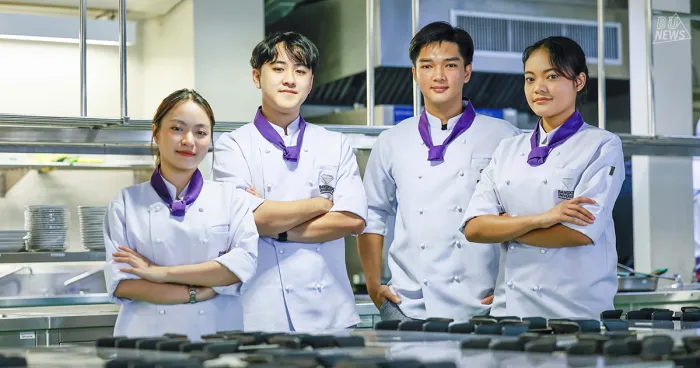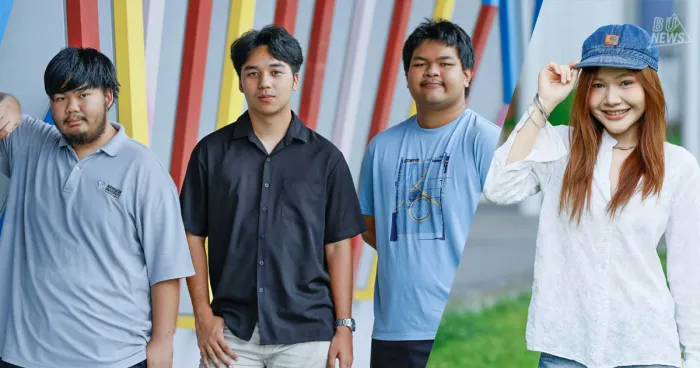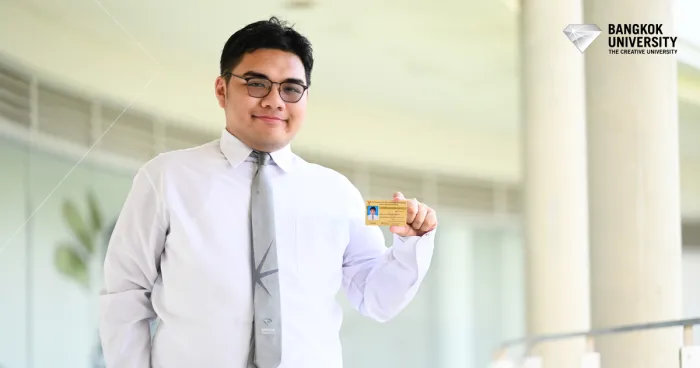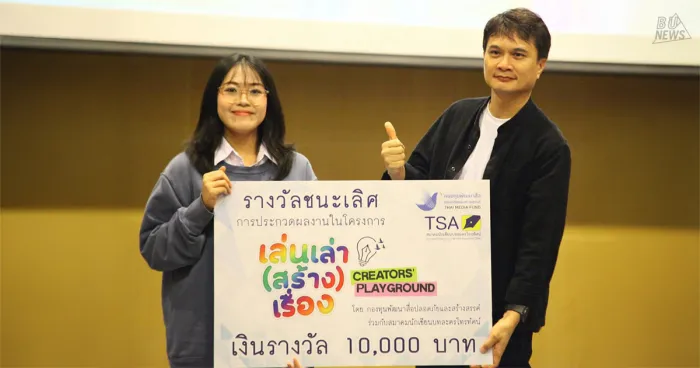Featured Stories
Featured Stories — 5 Bangkok University Student Representatives Win Thai Youth Science Ambassador Awards at National Platform: New Generation Power for a Sustainable World
5 Bangkok University Student Representatives Win Thai Youth Science Ambassador Awards at National Platform: New Generation Power for a Sustainable World

The Young Thai Science Ambassador Program, 20th cohort (YTSA#20) is organized to promote the development of science communication personnel at the higher education level, equipping them with knowledge and ability to convey scientific knowledge and stories about science, technology, and innovation from various perspectives under the theme "Circular and Sustainable - Restoring Life to the World – Net Zero and the Circular Economy," which is a challenging topic of great importance to the world's future, under the concept of effective climate protection management.
Let's read the stories of all 5 BU-ITI students and the fun they had as youth ambassadors through their amazing creative works that deserve a thumbs up.

Starting with two senior girls: Ms. Jiranan Prakotharn (Kate) and Ms. Araya Chai (Pop-Pap), Computer Science students, who shared their project's beginning. Kate learned about this project since freshman year from seniors and professors, but felt she couldn't manage her time well then. By junior year, she felt more disciplined in time management and sought new experiences. Pop-Pap, being introverted and not typically participating in activities, decided to challenge herself as graduation approached, applying just one day before the deadline without expecting to make it to round 3.

Learning Wonders
Kate discovered the true meaning of "science communicator" - not just someone who talks about science, but someone who can connect scientific knowledge to daily life and tell stories in an accessible way. She learned data visualization techniques at ThaiPBS, understanding how to make complex scientific topics understandable through visual storytelling.
Pop-Pap learned presentation techniques, facial expressions during presentations, and infographic creation. Despite the intensive 3-day program requiring overnight work to meet deadlines, she successfully completed her presentation despite initial nervousness.

Lucky to Be Part of the Program
The program provided more than expected - not just knowledge and experience, but also confidence. Kate gained confidence in communicating serious academic topics systematically.
Pop-Pap achieved something she never thought possible - presenting on a large stage in a major program, gaining new experiences and understanding her capabilities for future development.
Pride-worthy Works

Kate's work: "Plant for Mind, Plant for World" - connecting mental health and environment, showing how natural surroundings directly affect mental health and promoting the concept of "healing through nature" by planting trees.

Pop-Pap's work: "Platform" - about AI's role in helping developing countries achieve Carbon Neutrality goals through climate-resilient AI connected to digital technology access, addressing the urgent need to find solutions for rising CO2 levels.

Moving to the three junior students who coincidentally decided to join: Ms. Kanticha Boonsong (Woon-Sen), Information Technology student; Ms. Chanita Nuchanat (Queen), Game and Interactive Media student; and Mr. Jiraphat Deesara (Pui), Game and Interactive Media student.
Wun Sen: I happened to be the vice president of the branch, and Queen was the branch president, so we became close friends from that time. One day, when I was helping a professor with faculty work during an ongoing activity, I walked over and saw a professor talking with Queen. I greeted them normally, and during our conversation, the professor invited me to join this project. After the invitation, I went back to think it over because when I learned about the project details, I felt quite nervous since I wasn't sure if I could do it. I'm not very good at speaking in front of many people. I used to be afraid of holding microphones - the kind where you practice well, but when you grab the mic, you suddenly can't sing in competitions or speak at all. I'm someone who gets easily excited and nervous.
Queen: The professor came to invite me when I was about to submit my end-of-class assignment. The professor said they wanted me to try it, so I agreed to join this project. I saw that the professor mentioned there would be people from other universities participating too. My family was ready to support me, and I personally wanted to try doing a project since I already like doing activities.
Pui: It was at the end of the Fundamental Calculus class. Professor Kritsawan was the one who introduced this project and invited me to apply. They said this project was about science, so I became interested and accepted the professor's invitation. I studied the various details of the project and decided to apply because good opportunities like this don't come often. If I let it pass, I would really regret it. I was already interested in science as a foundation, and this project focused on Net Zero and circular economy, which were things I didn't know about or have knowledge of initially. When I first learned about this, I felt challenged, so I studied the information and presented the data I had researched, combining it with knowledge in things I liked, such as clean energy from solar cells. After presenting, I felt proud of what I had accomplished and felt that I had done my best.

The Wonder of Learning
Wun Sen: On Day 1, the project had us play various recreational activities to get to know other friends better. We joined meetings to listen to beneficial lectures from foreign experts. After that, we were randomly grouped to do various activities and think of topics and rough details. On Day 2, we worked in groups that were randomly formed the day before. We started working on individual projects, to be submitted before 23:00. But because this year's assignment was something most friends weren't familiar with - making infographics (except for me and some friends and seniors from our university who were familiar with it), and other problems, the project extended the deadline to midnight. But this marathon work battle wasn't over yet because the next morning, we all had to present on the main stage. I thought to myself, "OMG, will I get to sleep?" My memory isn't very good, and I'm forgetful too. After everyone submitted their work, we went our separate ways. After that, I started trying to understand and memorize information and prepared to answer questions from the committee. I went to bed around 4 AM, and my roommate went to bed past 5 AM. On Day 3, I was very excited because they randomly called people to present, but then it was my turn, and it went well.
Queen: On the first day, we first went to see the outside areas. The instructors explained various things about the topics we would work on and the format we would present, learning from people who work directly in this field to help us visualize and think of topics as a starting point. The next day, we did group activities with people from other faculties. We tried to find information in the Cube Building according to our assigned topics, practiced pronunciation and discussed using tone of voice in communication, and started working on the project we would present the next day. And the final day was the presentation day. I'll admit I was stressed because it wasn't something I had studied directly, unlike others who studied in this field, so I wasn't very composed. Day three was for presentations along with the award ceremony, and we got to meet seniors who participated in previous project rounds.
Pui: In this project, they would take us to learn about communication techniques and various ways of presenting information, including the role of science in various things in our current world. On the first day, the project took us to Thai PBS to learn about news presentation, including finding interesting topics and reliable information sources, as well as touring various working areas of Thai PBS. I studied and noted various techniques to be able to use them beneficially in research and presenting information in various fields for use in this project and in the future. Then we went back to the National Science Museum for lunch, and in the afternoon, I learned about science education formats and techniques for creating good infographics and additional project details. After that, there was English-language training with the Goethe Institute, followed by activities with friends, and they gave us personal time to design and develop our own work. On Day 2, the focus was on doing activities with project friends in the morning and learning about voice usage and techniques to engage audiences for effective communication. In the afternoon, they let us work on our projects until evening. At that time, I thought and developed the project according to my own understanding while seeking advice from various professors in the project. I learned techniques for designing good infographics and interesting topics. Even though I had never made infographics before, I put in my full effort and submitted my work on time. On Day 3, we had to present our work. When I woke up in the morning to prepare for the presentation, I found that some project friends had slept while others hadn't slept to prepare scripts for presenting their work to the committee that day. Everyone's work presentations looked very good, and they randomly called people to present on stage. I got the last queue before lunch and was a little excited, but during the presentation, I did my best. Even though I made some mistakes, I felt good about being able to learn and do various activities in this project.

Lucky to Be Part of This Project
Wun Sen: This project helped me better understand my potential and mistakes. It made me want to continue developing myself. I got to meet and exchange new knowledge with participants who joined, did fun activities, and even got cute prizes.
Queen: First, it provided experiences. The work of people who participated in the project was very eye-opening because there were some things I had never heard of before. It was amazing, and I got connections from both senior instructors and friends from different universities. Everyone gave very good advice and was always ready to help. Finally, I got many ideas for work I'll do in the future.
Pui: This project provided both scientific knowledge and various techniques for being a science communicator in Thailand. But importantly, what I learned was doing activities together with project friends and everyone's friendship.
Works of Pride

Wun Sen: My work is titled "Carbon Footprint." This work is about our daily lives that are telling us about carbon emissions that are closer to us than we think, and we might not even realize it. Carbon emissions aren't just about burning garbage, burning forests, or letting our cars emit black smoke.

Queen: My work is "Food Waste: From Waste to Alternative Resources," about using leftover food that's not just rice husks or rice straw to make alternative resources. We can use leftovers like eggshells and leftover rice through the pyrolysis process.

Pui: My work "EV Cars Are Good for Saving the World" is an infographic that tells information about EV cars - how they're beneficial when used and why we need to use EV cars. This work was inspired by seeing transport vehicles and public transportation that still use cars that emit carbon dioxide, harming the environment. So I presented using electric vehicles instead. Using electric cars is equivalent to reducing carbon dioxide emissions equal to planting 248,000 trees per year, which is equivalent to planting 25 million trees.



Information
Register Info
Contact Us





